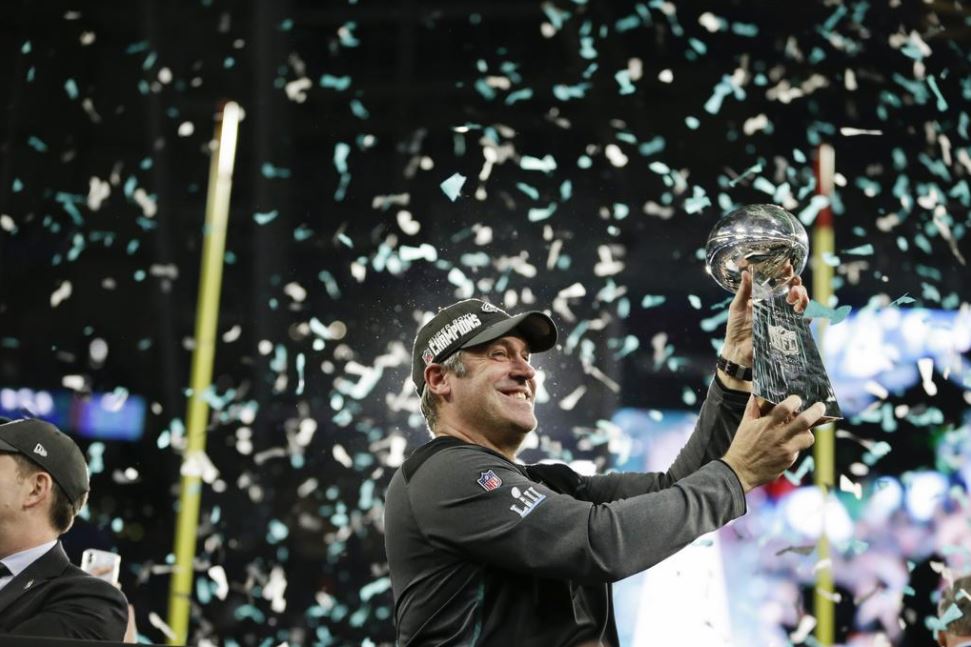Article originally published in the Philadelphia Business Journal on February 13, 2018
On Feb. 8, I watched the largest parade in Philadelphia’s history celebrating the Philadelphia Eagles’ victory against the New England Patriots in Super Bowl LII. Appreciative fans honored the Eagles, and the Eagles thanked their fans.
It was the first Super Bowl win for the Eagles and the first time they appeared in a Super Bowl since 2005, when they were defeated by the Patriots.
Many records were set during this most-recent Super Bowl. It was like watching two heavyweight opponents just slugging it out. As a dedicated Eagles fan, I was on the edge of my seat until the final, Hail Mary pass by Patriots quarterback Tom Brady fell incomplete. Congratulations to the defending Super Bowl champion Patriots for being such a tough opponent.
The underdog Eagles won the game with backup quarterback turned Super Bowl MVP Nick Foles, who joined the lineup after starter Carson Wentz tore the ACL in his left knee in a win against the Los Angeles Rams on Dec. 10. With that victory, the Eagles’ record rose to 11-2, and from there, with Foles in the lead, the Eagles were well on their way to postseason play.
As leaders, what lessons can we learn from the Eagles? Here are three major factors that led to Eagles’ victories during the season, including their Super Bowl victory.
1. A high level of trust among the front office, coaching staff and players
This was Eagles head coach Doug Pederson’s second year with the team. He replaced Chip Kelly in 2016 after the Eagles had missed the playoffs two years in a row. Kelly was said to have struggled with connecting with his team on a personal level.
Pederson was a different type of coach than Kelly, the type of coach Eagles Chairman and CEO Jeffrey Lurie was looking for. Quoting a December 30, 2015 ESPN article covering a news conference by Lurie, “Lurie mentioned the next coach needing to open his heart to players and to have ‘emotional intelligence.’ Kelly was frequently lambasted for his inability to connect with his team on a personal level.”
Pederson certainly had a different coaching style than Kelly and brought a different culture to the team, one that built trust between him and his players. That trust yielded results.
2. Talent, team depth and striving for excellence
In business and in sports, talent and depth are everything. The Eagles’ bench was deep in talent, thanks to the player selection skills of Howie Roseman, the team’s executive vice president of football operations.
The team lost several players due to injury during the season in addition to losing quarterback Wentz. Other players stepped up to fill the void. Watching the Eagles play this past season, I felt that they were playing for their teammates as well as their team. Players didn’t want to let their teammates down.
Every professional sports team is on a journey to be the best in the world at what it does, always striving for excellence. That’s how champion organizations are built and championships are won. Every organization should be on a journey to be the best in the world at what it does.
3. Running gutsy, aggressive plays, exemplified by the Philly Special
During the 2017 season, the Eagles led the NFL in two-point conversion attempts per game, as well as in fourth-down conversions per game.
The most memorable play of the Super Bowl, now forever burned into the memory of every Eagles fan, was dubbed the Philly Special. The Eagles were up 15-12 and facing fourth down on the one yard line with 38 seconds left to play in the second quarter.
Conventional wisdom would be to kick a field goal for nearly an assured three additional points. That would be the conservative, safe decision. Foles, however, went to the sideline and said to Pederson, “You want Philly Philly (click on link to watch video)?” Pederson knew what Foles meant. He wanted to go for a touchdown. After three seconds of thought, Pederson replied, “Yeah, let’s do it.” A great example of a head coach trusting the instincts of his quarterback and empowering him to make the decision in a situation that could have game-losing consequences.
Foles lined up behind center Jason Kelce but then rapidly moved to his right, allowing running back Corey Clement to take the snap. Clement tossed the ball to tight end Trey Burton, who then threw the ball to Foles, who caught it in the end zone for a touchdown with not a defender in sight. Foles became the first quarterback in Super Bowl history to both throw and catch a touchdown pass. This is the type of gutsy and innovative play that helps win games.
Pederson knew his players could perform at an aggressive level of play, going for it on fourth down as well as successfully executing long-yardage pass plays throughout the game. This did three things: It showed his players that he had confidence in them; it put points on the scoreboard; and demonstrated to the Patriots that the Eagles were more formidable offensively than perhaps they originally thought.
In business, the Eagles’ level of play is the equivalent to a company being so good at what it does that when a competitor goes up against them, their response is, “Oh no, not those guys.” Companies performing in this manner become the preferred provider in the markets they serve.
Leaders of all organizations can take a lesson from the 2018 Super Bowl champions, the Philadelphia Eagles.
Stan Silverman is founder and CEO of Silverman Leadership. He is a speaker, advisor and nationally syndicated writer on leadership, entrepreneurship and corporate governance. Silverman earned a Bachelor of Science degree in chemical engineering and an MBA degree from Drexel University. He is also an alumnus of the Advanced Management Program at the Harvard Business School. He can be reached at Stan@SilvermanLeadership.com.

